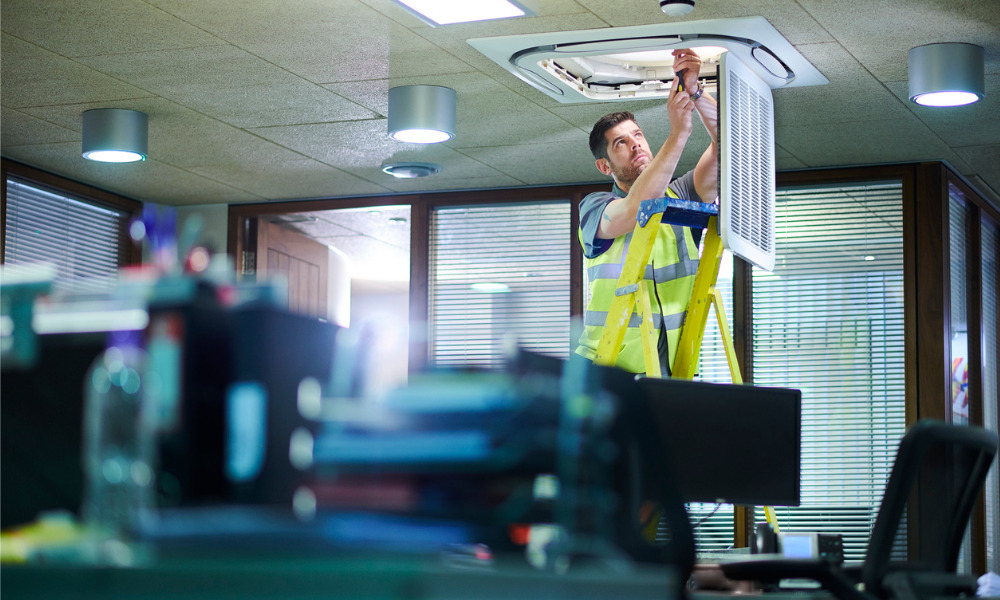Many HVAC systems aren’t able to remove smaller particles found in viruses such as COVID-19, seasonal flu

The air people breathe has a lot of effects on their body. So, it only makes sense that people should be inhaling air of good quality, especially inside closed quarters, like a workplace.
“Most people spend the vast majority of their time indoors,” says Patrick O’Neil, president of tech company mCloud Technologies, in an interview with Canadian HR Reporter.
“So, it obviously makes sense that the environment that you’re in will affect you.”
Indoor air of good quality is one that lacks pollutants, he says, and there are plenty of pollutants in an enclosed space.
“First of all, you’ve got people that are breathing out carbon dioxide and potentially diseases, but the building environment itself is off-gassing volatile organic compounds such as particulates and so on,” says O’Neil.
“Another important factor for air quality is the humidity level. You may have seen around some of the publications about COVID that if you can maintain the humidity level within a band of 40 to 60 per cent relative humidity, that minimizes the risk of COVID getting transmitted to an individual. Because below that, it’s dry, it affects your mucus membranes, and similarly, there are issues with higher humidity.”
The safety of people while inside buildings has been a crucial consideration as the health crisis continues, according to another expert.
Removing particles
COVID and viruses in general are quite small, says O’Neil.
“Most HVAC systems have some kind of filter in them to remove the larger particles. The problem with [most of] those filters is they’re only going to remove large particles from the air stream, generally speaking... Most filters don’t remove the virus.”
There are two things that employers and building managers can do to address this, he says.
“You have to have filtration that can remove very small particles, and there are filters that do that, or you have to disinfect or purify the air by deactivating the COVID virus.”

Patrick O’Neil
While roughly three-quarters of U.S. workers want daily cleaning of their workplace amid the pandemic, many want an extra layer of defence these days – disinfecting, according to a previous report.
There are a lot of technologies available to address this issue, and they do not cost a lot of money, says O’Neil.
“It’s really not that expensive relative to what you’re spending on the lease itself… To put this sort of technology in, it’s 10 cents, five to 10 cents per square foot. It’s not a huge expense, it's just a matter of awareness and willingness to pay that additional amount, whether it's the tenant paying it or the landlord; someone has to step up and do that.”
Benefits to improving air
Addressing this issue can be beneficial for business, says O’Neil.
“Forget about COVID for a minute. There has been an annual cycle of flu and colds that come through the world and we have, for some reason, just accepted that if someone in the office gets the flu, it’s just going to be passed around to people in the office and there’s nothing we can do about that. Well, that’s not really the way to look at it… we could do a lot more in that office to minimize other people getting sick if someone has the flu,” he says.
“And there’ll be financial benefits to that for the business. You don’t have sick leaves; you don’t have people who are feeling crappy for a week because they caught a bug at work. So, in indoor air quality, an ounce of prevention is really worth a pound of cure in terms of the impact on the people on the space.”
And employees who may be suffering from bad air quality can demand action from their employers, says O’Neil.
“That’s the most impactful way to do it; just to get together and say, ‘Look, this is important to us. This is an expectation that we have, as employees of this company, to have a safe indoor environment to work in,’” he says.
“People expect the temperature to be within a certain range so they’ll be comfortable. Well, I would argue, indoor air quality… is more important than the temperature, but for some reason doesn’t even show up in most people’s considerations.”
Many workers aren’t necessarily afraid of returning to the office, they just don’t want to, according to an earlier survey.




